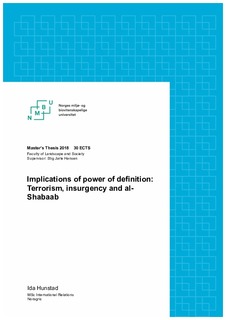| dc.description.abstract | Although terrorism is an ambiguous term lacking an internationally agreed-upon definition, designations of perceived terrorist groups are common practice for several states. Being designated as terrorists carry immense implications due to the defining power of terrorism, as well as the many workings of the word – as a label, phenomenon and definition. We can therefore speak of a considerable power of definition linked to terrorism. One group who has been designated as terrorists by six states is the Somali-based group al-Shabaab. After the first designation in March 2008, a change was observed in the group’s strategy, as terrorist attacks against civilians increased, as well as the use of suicide bombings.
The aim of this thesis is to investigate terrorism and its defining powers, and to determine the implications of power of definition for al-Shabaab. To this end, the research question is as follows: What are the implications of power of definition and defining al-Shabaab as a terrorist organisation as opposed to an insurgency?
The research question is answered through a qualitative case study of al-Shabaab, in combination with primary and secondary sources. The primary sources have been collected through qualitative semi-structured interviews with respondents from governmental and non-governmental organisations and institutions. The responses of the informants and the review of secondary sources show that the implications of being designated as terrorists as opposed to insurgents are widespread. These results indicate that al-Shabaab’s change in strategy post-March 2008 can be attributed the defining powers of terrorism, as it not only changed the perception of the group externally but also how the group started to perceive themselves. The thesis further adds that al-Shabaab is not a homogenous group, as often portrayed in the media, but rather made up of sub-groups and cells with different tasks. It is only some of these cells that carry out unmitigated terror activities, although counterterrorist measures are aimed at the whole group. The study therefore argues that a terrorist designation delegitimizes the whole group and has widespread political and social consequences, while only some sub-groups are responsible for terrorist activities. The thesis thus contends that al-Shabaab will not be defeated by military might alone, and that greater contextual understanding is needed. | nb_NO |

